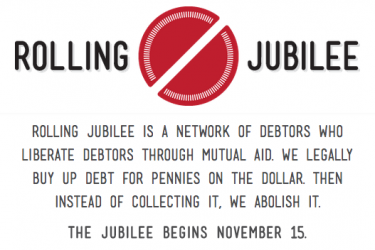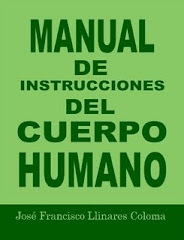STRIKEDEBT.ORG
Debt is a tie that binds the 99%.
We are not a loan.
lA TRAMPA DE LA DEUDA Y DEL "CRECIMIENTO" o la estupida medida del Producto interno bruto - PIB :
Strike Debt came from a coalition of Occupy groups looking to build popular resistance to all forms of debt imposed on us by the banks.

Debt keeps us isolated, ashamed, and afraid. We are building a movement to challenge this system while creating alternatives and supporting each other. We want an economy where our debts are to our friends, families, and communities — and not to the 1%.
Towards bailing out the people?
However, beyond education and acts of solidarity, several Strike Debt activists have a more general proposal to put forward. They suggest a modern debt jubilee, meaning a massive debt cancellation.
The Australian economist Steve Keen also calls this idea a “quantitative easing for the people,” in reference to the huge support central banks give to private banks through their policy of purchasing assets. He explains his proposal on his site:
Fistfullproductions has uploaded an interview with Keen:A Modern Jubilee would create fiat money in the same way as with Quantitative Easing, but would direct that money to the bank accounts of the public with the requirement that the first use of this money would be to reduce debt. Debtors whose debt exceeded their injection would have their debt reduced but not eliminated, while at the other extreme, recipients with no debt would receive a cash injection into their deposit accounts.
The anthropologist David Graeber is one of the main sources of inspiration behind the operation. This anarchist, one of the early instigators of Occupy Wall Street, is the author of a key work published in 2011,
“Debt: the first 5,000 years,” in which he explores the history of debt, and launches an appeal for a debt jubilee, which was an important custom in antiquity, as he points out in his book.
In the third edition of the review Tidal, edited by the Occupy movement, he argues:
So in the end why not give money directly to the people if we are now giving it to the banks? Presented in these terms, the idea probably seems less absurd.No doubt, readers will object: “but if you just print trillions of dollars, wouldn’t that cause severe inflation?” Well, yes, in theory, it should. But it seems the theory here is flawed, since that’s exactly what the government is doing: they’ve been printing trillions of dollars, and so far, it hasn’t had any notable inflationary effect.(…)The problem is it didn’t work. Either to get the economy moving, or to increase inflation. First of all, banks did not invest the money. Mainly, they either lent it back to the government again, or deposited it in the Federal Reserve, which paid them a higher interest rate for just keeping it there than they were charging those same banks to borrow it. So in effect, the government has been printing money and giving it to the banks and the banks have just sat on it.
In the name of what type of ethics does the debt contract rule?
Going beyond economic justifications, Occupy activists completely reject the moral argument often associated with debt according to which “all debt should be repaid.” On the site The Occupied Times, Michael Richmond writes:
How long will the strike hold? It's difficult to predict, but it is sure that one year after the birth of Occupy Wall Street, the emergence of a global consensus around the operation is marking the start of a new era for the movement. As Astra Taylor interpreted it on September 5 2012 on the site The Nation:What kind of morality is this morality of debt that says paying one’s debts is more important than anything else? We are seeing a regression back to Victorian times when debtors were criminalised, jailed and branded with a stigma that couldn’t be erased. And yet, everyone is in some kind of debt because the system is built on it, none more so than the entire financial sector which can only survive on public bailouts.
Debt, a growing number of organizers believe, has the potential to serve as a kind of connective tissue for the Occupy movement, uniting increasingly dispersed organizing efforts around a common problem (debt) as opposed to a common tactic (occupation).In another article on the same site, David Greaber goes as far as to wonder whether debt could trigger a revolution:
Occupy was right to resist the temptation to issue concrete demands. But if I were to frame a demand today, it would be for as broad a cancellation of debt as possible, followed by a mass reduction of working hours - say to a five-hour workday or a guaranteed five-month vacation.By attacking debt, Occupy is attacking the basis of the system, and no longer only those who benefit from it or even their tools (austerity, bail-outs, central banks). The Occupy movement's change in direction is certainly ambitious, difficult and resolutely more subversive. However for David Greaber, this is not the problem:
If such a suggestion seems outrageous, even inconceivable, it’s just a measure of the degree to which our horizons have shrunk.This post is part of our special coverage #Occupy Worldwide.




















No hay comentarios:
Publicar un comentario